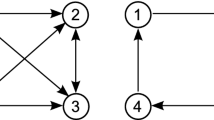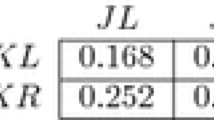Abstract
A family of solutions for finite noncooperative games is introduced in which players are not confined to use best responses exclusively. Instead, the definition requires that the probability of use of a strategy must be a monotone-nondecreasing function of its expected payoff. For the two-person case, some results characterizing behavior at such solutions are given and some examples are examined.
Similar content being viewed by others
References
Friedman J W, Rosenthal R W (1986) A Positive Approach to Noncooperative Games. Journal of Economic Behavior of Organizations 7: 235–251
Harsanyi J (1973) Oddness of the Number of Equilibrium Points: A New Proof. International Journal of Game Theory 2: 235–250
Harsanyi J (1974) The Tracing Procedure: A Bayesian Approach to Defining a Solution for n-Person Noncooperative Games. International Journal of Game Theory 4: 61–94
Lemke C E, Howson Jr J T (1964) Equilibrium Points of Bimatrix Games. SIAM Journal of Applied Mathematics 12: 413–423
Rosenthal R W (1981) Games of Perfect Information, Predatory Pricing and the Chain-Store Paradox. Journal of Economic Theory 25: 92–100
Selten R (1978) The Chain-Store Paradox. Theory and Decision 9: 127–159
van Damme E (1983) Refinements of the Nash Equilibrium Concept. Lecture Notes in Economics and Mathematical Systems: 219: Springer-Verlag, Chapter 4
van Damme E (1987) Private communication
Wilson R (1972) Computing Equilibria of Two-Person Games from the Extensive Form. Management Science 18: 448–460
Author information
Authors and Affiliations
Additional information
This material is based upon work supported by the National Science Foundation under Grant No. SES86-03550 at SUNY, Stony Brook. I am grateful to Abraham Neyman for helpful suggestions, to Bryan Boudreau and Doug Zona for excellent programming assistance, to a referee for pointing out errors in an earlier version, and to Eric van Damme for pointing out the close relationship between his control-cost theory and the theory developed here.
Rights and permissions
About this article
Cite this article
Rosenthal, R.W. A bounded-rationality approach to the study of noncooperative games. Int J Game Theory 18, 273–292 (1989). https://doi.org/10.1007/BF01254292
Received:
Revised:
Issue Date:
DOI: https://doi.org/10.1007/BF01254292




